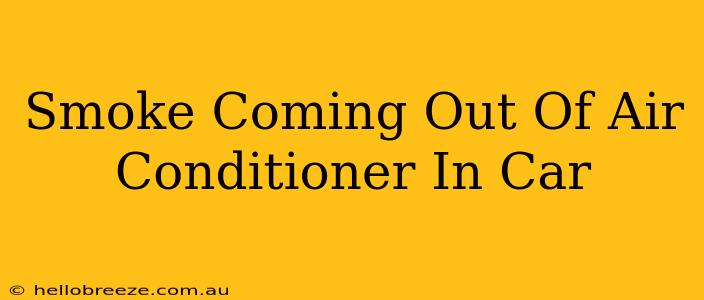Seeing smoke billowing from your car's air conditioning vents is undeniably alarming. This isn't just a minor inconvenience; it's a serious issue that requires immediate attention. Ignoring it could lead to significant damage and even a fire. This comprehensive guide will walk you through the potential causes, immediate actions, and long-term solutions for smoke emanating from your car's AC system.
Identifying the Source of the Smoke
Before you panic, try to determine the color and density of the smoke. This can provide valuable clues about the underlying problem:
-
White Smoke: This often indicates water vapor, which might be harmless if it's a brief puff after turning on the AC, especially on a humid day. However, persistent white smoke could signify a refrigerant leak, a failing evaporator, or even a problem with the blower motor.
-
Blue Smoke: Blue smoke is usually a clear sign of burning oil. This is a serious problem, likely originating from a worn-out or damaged compressor. Immediate action is crucial to prevent catastrophic engine damage.
-
Black Smoke: Black smoke points towards burning debris or electrical components. This could indicate a short circuit, a malfunctioning resistor, or something caught in the blower motor. This requires immediate professional attention.
-
Grey Smoke: Grey smoke often suggests a mixture of oil and water. It's a serious issue requiring prompt diagnosis and repair by a qualified mechanic.
Immediate Actions to Take
Safety First! If you see smoke, pull over to a safe location immediately. Turn off the air conditioning and turn on the ventilation system to help clear the smoke. Do not continue driving.
Here's a breakdown of what to do:
- Assess the situation: Observe the color and amount of smoke. Take photos or a video if possible for your mechanic.
- Turn off the AC: This prevents further damage and potential fire hazards.
- Turn on the ventilation: This helps clear the smoke and improves visibility.
- Call for assistance: Contact a trusted mechanic or roadside assistance.
Do not attempt to diagnose or repair the problem yourself unless you have extensive automotive experience.
Potential Causes of Smoke from Car AC
Several factors can cause smoke to emerge from your car's air conditioning system. Here are some of the most common:
1. Refrigerant Leaks
A leak in the refrigerant lines can cause a burning smell and potentially white or grey smoke. Refrigerant itself isn't flammable, but the resulting friction and overheating can lead to smoke.
2. Compressor Failure
The AC compressor is a vital component responsible for circulating refrigerant. A failing compressor can overheat, leading to burning oil and blue smoke.
3. Electrical Short Circuit
Electrical shorts in the blower motor, resistor, or other components can cause burning smells and black smoke.
4. Debris in the Blower Motor
Small debris such as leaves or insects can get caught in the blower motor, leading to burning and smoke.
5. Overheating
Excessive use of the AC in hot weather, or a blocked airflow can cause the system to overheat and produce smoke.
Prevention and Maintenance
Regular maintenance is key to preventing issues with your car's air conditioning system. Consider these preventative measures:
- Regular AC Inspections: Have your AC system inspected by a professional mechanic at least once a year.
- Refrigerant Checks: Ensure your refrigerant levels are adequate and there are no leaks.
- Keep the Air Filters Clean: Clogged air filters restrict airflow and can cause overheating.
- Avoid Overuse: Don't run the AC at full blast for extended periods, especially in extremely hot weather.
When to Call a Professional
If you see any smoke coming from your car's air conditioner, do not hesitate to contact a qualified mechanic. Ignoring the problem can lead to significant damage and potentially dangerous situations. A professional can diagnose the exact cause and perform the necessary repairs safely and efficiently. This ensures the longevity and safety of your vehicle.
By understanding the potential causes and taking prompt action, you can minimize damage and ensure the safe operation of your car's air conditioning system. Remember, safety should always be your top priority.

